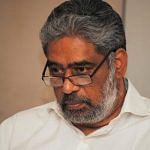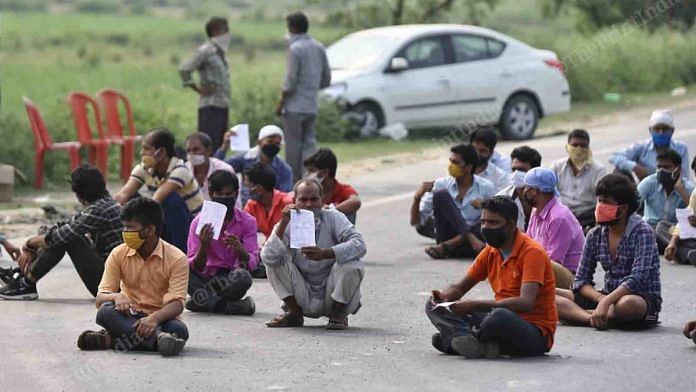 Don’t call it reform
Don’t call it reform
Pratap Bhanu Mehta| Columnist
The Indian Express
Indian labour laws needed reform, but the ordinances being passed during lockdown are, argues Mehta, taking away even the limited powers that labour had. “The Industrial Relations Code was introduced in the Lok Sabha in November 2019. The Standing Committee has just given its report. This was a sensible way to proceed,” he explains. But now, the Modi government has launched “a four-pronged assault on labour that threatens to undermine the Modi government’s own legislation.” First on constitutionalism, second on labour’s bargaining power, third is the ideological assault on Indian labour and finally, the cultivation of authoritarianism. He ends by noting, “‘Reform’ should be used only when a particular measure actually achieves a desired objective.”
 All major economies will be drawn into US-China contestations over international trade
All major economies will be drawn into US-China contestations over international trade
C. Raja Mohan | Director, Institute of South Asian Studies, National University of Singapore
The Indian Express
“Significant political contestations within the US and between the US and China to reform, reorient or bypass the WTO system are at hand,” writes Mohan, adding that all major economies will also be drawn into this debate. He notes that while calls for cancelling free trade have been on for a while, the global pandemic has only accelerated that conversation. Mohan cites an article by US senator Josh Hawley, from Missouri, who said that under the World Trade Organisation “capital and goods moved across borders easier than before”; but added, “so did jobs”. Biden as the Democratic candidate has only further underlined the importance of trade and China in the upcoming US p[residential election, given he is pro-economic integration with China and pro-free trade. India needs to look out for such changes because “in the mid-1990s (we) struggled to cope with the profound changes in the global economic order.”

Playing out live, a narrative of discrimination
Brinda Karat | CPI (M) Member and former Rajya Sabha MP
The Hindu
Karat argues that “The war on the pandemic is turning out to be an undeclared war against the workers of India, especially Adivasis.” With the government being unsure of the total number of migrant workers in India, they are not even aware of the “social composition of this large labour force.” Focusing on the Adivasis and their seasonal, circular migration both intra and inter state, and the labour reforms expected, Karat says, “they are totally ‘invisibilised’ in the government policies in the package announced.” Pointing out the Modi government’s pro-corporate agenda that ignores the rights of the Adivasis, Karat ends by saying, “The lack of protests because of the lockdown does not mean that Adivasis will remain silent on all these issues.”

India will have to contest charges of religious bias
Vivek Katju | Former diplomat
Hindustan Times
Katju brings to light a growing disquiet among Islamic countries about India’s society and polity exhibiting Islamophobia – the irresponsible reactions to the Tablighi Jamaat incident being the latest, preceded by the scrapping of Article 370 in Jammu and Kashmir, the CAA-NRC and the Delhi riots. While Modi has made speeches and statements that reflect unity and harmony, the ground reality differs. Katju ends by noting that it is necessary “to assure Islamic nations that India is not moving away from its constitutional moorings by ensuring harmony and effective action against those who disturb it irrespective of their party affiliations.”

It’s now or never: States are driving bold reforms. We will never get this opportunity again, seize it
Amitabh Kant | CEO, NITI Aayog
The Times of India
Given the impact of the Covid-19 pandemic and lockdown, Kant urges states to usher in radical labour market reforms. States like Madhya Pradesh, Uttar Pradesh and Gujarat have already done so, he says, “by freezing a vast number of acts and giving industries flexibility.” India has had one of the most rigid labour markets in the world, a reason behind small enterprises and high informal employment, Kant says, adding that “Several studies have shown that these laws hampered the ability of an enterprise to respond to changing business dynamics.” Kant lists four ways states can improve efficiency in the post Covid-19 world — support for small land holders through contract farming, implementation of conclusive land titling and of One Nation One Ration Card, and reforms in the electricity sector.
 An infodemic waiting to explode
An infodemic waiting to explode
Pallava Bagla | Science Communicator
The Financial Express
The author expresses concerns over discontinued daily Covid-19 briefings and notes that according to experts, India might be seeing just the tip of the infection iceberg right now. He points out that the ICMR, which promised detailed briefings every Friday, has not held a briefing in six weeks. “The last full-fledged briefing by a battery of top Indian virologists was on March 17”, he says, adding that the lack of medical communication and absence of technical experts at briefings is “unacceptable in the largest democracy where inculcating a scientific temper is an accepted principle”. He suggests that briefings should take place daily along with medical experts which can save India from “knee-jerk reactions”.

Labour law reform experiments that could show us a path ahead
V. Anantha Nageswaran | Dean of the IFMR Graduate School of Business (Krea University)
Mint
The author argues that by changing labour law in some states, the need of changing policy elsewhere can be assessed. During this serious economic crisis, the only option left to the government is to undertake far-reaching reforms and then observe how they play out, which is not too different from what was done in 1991. The author claims that if some states take some radical measures and some do not, it provides a good setting for a controlled experiment.

Millions of young losing their jobs is long-term cost of lockdown
Mahesh Vyas | MD & CEO, CMIE
Business Standard
With the help of data, the author explains the crisis that is at hand given that young people are losing their jobs due to the pandemic. Over 27 million youngsters in their 20s lost their jobs in April, he says, which will have serious long-term repercussions. Even though job losses have been registered in every group, it is particularly high among the youth, which will lead to loss of savings, increase in household debts and debt delinquency, which will have further implications, the author notes.

 Tracking Covid-19 deaths over time
Tracking Covid-19 deaths over time
K Srinath Reddy | President, Public Health Foundation of India (PHFI)
Surabhi Pandey | Research Scientist, Public Health Foundation of India
Financial Express
The authors analyse the time trends of reported Covid-19 deaths in 26 countries from different continents and conclude that India has fared relatively well in containing deaths per million population. The authors also note that India has maintained a much lower mortality trajectory than Germany, Italy, Spain, Sweden, the UK and Belgium, which reported their first cases within the same seven-day window as India. These may be early days to draw definitive conclusions, but these trends will give us insights into the behaviour of the virus in different populations, the authors note.




Those commentators calling for radical labour reforms are not reforms but introducing “bonded-slave-labour-system” with a spineless apex court a silent spectator, in all human rights questions. These are not reforms.
Shikha singh advocate Allahabad High court, sir Katju please don’t blame the suitable and satisfactory work for our Indian people in such pendamic COVID-19.there is no discrimination between one religion to other.so please support the solid work of present government .
1. ” SIR, reform is successful only when a particular measure actually achieves a desired objective. There is no need to use it when a desired objective has already been achieved. For the daily or weekly doses of GYAN, it would be nice to read one just one article which lays down a clear policy with details of implementation on a topic of your choice.
2. Then we have the bleeding hearts from the 5 star political culture, moaning about the lack of data on “social composition of this large labour force.” which they ensured was never measured and documented. The culture of thriving in ciaos was sought to be changed by AADHAR, which is being accused of stripping a naked man under the garb of privacy to protect in fact their own multiple benami properties and bank accounts.
3. Ask people who have spent their lives in the Arab world. There is no disquiet among Islamic countries about India’s society and polity exhibiting Islamophobia, the rich Arabs are busy exploiting the Indians and the poor one bust enjoying the fruits. Post 9/11 the arrogance of the Arabs has just disappeared, they now know that they are just about being tolerated all over the world. discussions on the so called Islamophobia is only restricted to the TVs and drawing rooms of the LEFT LEANING, LIBERAL, INTELLECTUALS.
The rich Arab is busy getting his 72 —– without going to heaven with the poor one waiting for the trickle down.
Katju sahab; your reading is totally false.
You are not only succumbing to ISI propaganda but lending it support.
There is no discrimination against Muslims per se. Yes, TJ deserve the condemnation for its behaviour.
This kind of behaviour in Islamic countries would have brought more severe reaction on them.
They should thanks their stars to be in India and thus getting away from any punishment except a bad name their actions accrued.